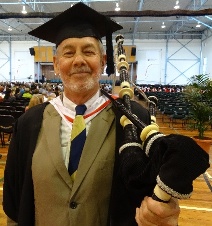 A
Charles Sturt University (CSU) PhD graduate's research found that how corporate
leaders communicate can significantly affect an organisation's reputation, share
price, and more.
A
Charles Sturt University (CSU) PhD graduate's research found that how corporate
leaders communicate can significantly affect an organisation's reputation, share
price, and more.
Dr Donald Alexander (pictured), course director and senior lecturer in public relations and organisational communication in the CSU School of Communication and Creative Industries, will receive his PhD at the Faculty of Arts graduation ceremony at 3pm Thursday 17 December in Bathurst.
"My PhD research has clearly demonstrated the attributes a Chief Executive Officer (CEO) requires when developing a communication strategy that will help them to manage their reputation and that of their organisation with investors, analysts and the media," Dr Alexander said.
"A CEO is responsible for their organisation's reputation, economic value and social responsibilities.
"Therefore, how key external stakeholders such as investors, analysts, and the media perceive the communication attributes of a CEO can have a very significant impact on an organisation's reputation and share price, as well as their own careers.
"CEOs need to be perceived as being transparent, trustworthy, consistent, credible and as communicating a vision."
Dr Alexander said CEOs have many important tasks, such as managing their organisations' product development, ensuring all employees are satisfied with their jobs, and maintaining and growing profitability.
"These are all vital tasks but none of them can succeed unless the CEO themself understands how their communication is perceived, received and understood by their key external stakeholders," he said.
"Investors and analysts can make or break a company, and therefore a CEO, with negative reports and share 'sell' recommendations.
"Organisational wealth can be destroyed through a lack of effective communication about values, vision, mission and results.
"Consistent negative media reports about a CEO, or the company, can also create disharmony among a board, or senior management, or the staff. Examples from National Australia Bank and James Hardie Industries clearly show that a CEO who is not aware of how to manage their external communication can have a short shelf-life."
Dr Alexander said university Masters of Business Administration programs need to ensure they have communication elements in their curriculum, and executive search companies will now have another set of criteria for assessing the effectiveness of prospective CEOs.





Social
Explore the world of social